
Jan 13, 2021 | Staying on Top, UpstateVibe365
 Kyle Player, Executive Director of Agribusiness Center for Research and Entrepreneurship (ACRE) talks about the ACRE curriculum and funding and introduces grant recipients Lover Farms in Pickens County and The RobinHood Group’s Farmers Market Flavors Ice Cream Company in Union County.
Kyle Player, Executive Director of Agribusiness Center for Research and Entrepreneurship (ACRE) talks about the ACRE curriculum and funding and introduces grant recipients Lover Farms in Pickens County and The RobinHood Group’s Farmers Market Flavors Ice Cream Company in Union County.
ACRE was established in 2017 with a goal to promote agribusiness in South Carolina, particularly innovative, out-of-the-box thinkers. ACRE helps small-business owners stay in business longer, reach more people, find new markets, and supplies grant funding. The main goal of ACRE is to support entrepreneurs in realizing their dream of having an agribusiness in South Carolina.
ACRE provides two programs to support entrepreneurship. The first is the Curriculum program, taught by the Clemson Agribusiness Extension Team. Businesses learn how to prepare a business plan and a business pitch. Upon successful completion of the program, a panel of judges selects multiple businesses to receive up to $5,000 each.
The advanced program offers larger grants and other support to those who have an established business or product but are struggling to get to the next step.
ACRE also offers free webinars and workshops to connect businesses with additional funding, provide business plan assistance, form connections with retail markets, and learn to create new revenue streams. Relationships are cultivated over years to help agribusinesses be the best they can be.
ACRE has assisted 600 South Carolina residents and funded $490,000 to 35 entrepreneurs over their first three years.
Kyle introduced Lover Farms and Farmers Market Ice Cream, two recent grant award recipients who have been through the ACRE curriculum.
Lover Farms
Brittany Arsiniega and Brit Hessler met last summer after Brittany had purchased a farm, her lifelong dream. Brit had been managing a farm in North Georgia and their skills (and names) seemed to match up well. The name of the farm signifies their love for the land, the animals, and the people they serve.
Brittany and Brit were excited about farming and other opportunities for people to come together. Brit is also an artist, herbal practitioner, and has developed classes and other opportunities for community building and resource sharing, teaching skills to take home and share with wider communities.
Lover Farms has a variety of products and services, including a CSA (community supported agriculture) program. Included in your weekly box of veggies are unique items like locally made jerky, natural soaps, tinctures, syrups, and screen-printed textiles.
Lover Farms is adapting as ideas are suggested. A CSA subscriber asked if he could bring his company to have a COVID-safe event, and this became a large revenue stream for the farm. Someone asked if they have underwear, so over the holidays their biggest seller was screen-printed undies!
Farmers Market Flavors Ice Cream Company
Elise Ashby of RobinHood Group manages the Union County Farmers Market. A couple years ago Elise offered to do cooking demonstrations to help farmers sell their produce. During the summer, someone mentioned ice cream and Elise remembered seeing okra ice cream on “Iron Chef”. Although she is not a lover of okra herself, she created an okra-blueberry ice cream and people loved it. Next she tried cantaloupe-tomato ice cream.
Elise wanted to encourage disadvantaged youth in Union County so she designed a program to encourage kids to garden and consume the produce. After receiving a grant from the USDA to start Farmers Market Flavors Ice Cream Co., Elise decided to go one step further and won a grant to get kids in the garden this spring and make ice cream in the summer. The kids will grow the produce, make the ice cream, and create marketing materials, packaging, and the website.
Kyle: What was most important thing you took away from the curriculum?
Brittany: It was so extraordinarily helpful to be forced to create spreadsheets with actual numbers; having to calculate what cost of goods sold was and how we were going to distribute our overhead costs, things like utilities and insurance, across our products, and then being able to see what we actually needed to charge. You can actually calculate the minimum amount you need to charge to cover your costs.
Brit: I just called Brittany the other night and said, ‘I just crunched some numbers!’ The program taught us to think more creatively about how we spend money and to value our own skills and time, and delegate some things to other people.
Elise: The accounting course and finance was the most challenging and the most important, but also important was the marketing aspect, packaging, labeling and creating a website. I am hoping that in creating, kids feel ownership, and find potential future jobs.
Kyle: How will your business benefit the Upstate?
Elise: I think ice cream benefits everybody. When you are feeling bad, get an ice cream! Farmers Market Flavors ice cream is something parents love getting for kids because it is healthy. Kids are eating a serving of three of vegetables. You can eat it for breakfast! It is the perfect food!
Brittany: In the short term, having a place that people feel safe gathering feels like an immense asset for our community. We have had family events and work events. The Furman Women’s lacrosse team is coming to do a teambuilding event. In a time when every social activity is loaded with guilt and danger, having a place where you can genuinely enjoy socializing feels really important. In the long run, we see the network of relationships that we are building just beginning to grow.

Jan 11, 2021 | Community Vibrancy, Staying on Top, UpstateVibe365
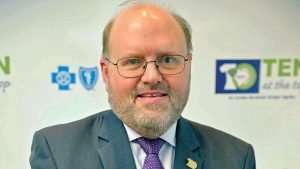
Dean Hybl, Executive Director of Ten at the Top
By Dean Hybl, Executive Director, Ten at the Top
There is a sign in the window of the ROMA Ristorante Italiano in downtown Laurens that I think perfectly captures the strange and challenging journey that was 2020.
It says, “Uncharted Waters Make Brave Adventurers.”
While certainly the level of difficulty has varied based on individual circumstances, in one way or another we all became adventurers in 2020, doing our best to navigate a world that was suddenly flipped upside down by disruptions including a global pandemic, social unrest and economic hardship.
When 2020 began, the course for the year appeared to be generally straightforward. With unemployment across the state and country at record lows, the focus was on talent attraction and reducing barriers to employment (most notably access to transportation and skill training).
Then suddenly, in what seemed like a blink of an eye, the landscape totally changed. The declaration of a global pandemic quickly resulted in stay-at-home orders, shortages of essential goods and a rapid rise in unemployment to historically high levels. The corresponding strains on our economy are still being felt and have created additional instability for many.
Adding another level of tension and uncertainty were highly publicized incidents of police brutality that also brought the issues of personal safety and equality to the forefront.
While we all have spent the last nine months maneuvering the same storm, we have each been in our own boat (spaced out 6 feet apart).
Some of us quickly adjusted to working from home while our kids also had to deal with the challenges of virtual school. For others, unemployment, sickness or general instability have made the journey even more difficult.
Throughout this time, we have been quite fortunate here in the Upstate, as I am sure is the case in other parts of the country and world, to have a brave group of adventurers who have overcome the challenges of uncertainty to instead take on the difficulties head-on.
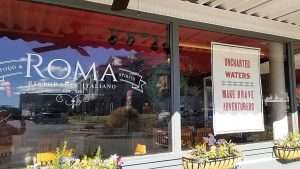 We recognized more than 130 of our “Upstate Unsung Heroes” during a Ten at the Top event in November, but there are undoubtedly many more people within our region who have been at the forefront of ensuring the safety and well-being of all residents over these challenging times.
We recognized more than 130 of our “Upstate Unsung Heroes” during a Ten at the Top event in November, but there are undoubtedly many more people within our region who have been at the forefront of ensuring the safety and well-being of all residents over these challenging times.
Whether as community leaders or front-line essential workers, there have been many “Brave Adventurers” who are leading the way into what is still an unknown and uncertain future.
As we leave 2020 behind (thankfully), it sure would be nice to have a crystal ball that could help us sneak a glimpse at what the future has in store.
As a nonprofit organization focused on building regional collaboration and increasing our collective capacity around issues that impact economic vitality and quality of life, we at Ten at the Top are specifically focused on understanding how we can work individually and collectively to navigate the challenges ahead.
To help us gain a clearer understanding of the impacts being felt across our region and state as well as what might be coming moving forward, Ten at the Top has solicited the input of 25 business, government and community leaders as part of an initiative we are calling “Focus on the Future.”
Throughout 2021, we will regularly be reaching out to these community leaders asking for their input around ongoing issues as we look to maneuver through the continued uncharted course ahead.
The first insights from this group can be read now on the Ten at the Top website, and the group will continue to share its perspective throughout the year.
While an uncharted future that will certainly include more rough waves is intimidating and concerning, I believe we can take comfort in knowing that as an Upstate region we are blessed with many insightful leaders and brave adventurers that will help us get through this tough time and continue to stay on course for making the Upstate a leading place for all residents to live, learn, do business and raise a family.
You can learn more about Ten at the Top and the Focus on the Future initiative at www.tenatthetop.org.
You can read the article in Upstate Business Journal here.

Jan 8, 2021 | Staying on Top, UpstateVibe365
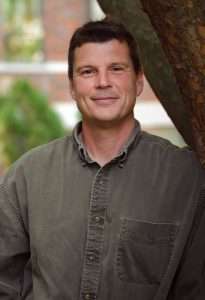
Scott Baier, Ph.D., Professor and Chair, John E. Walker Department of Economics, Clemson University presented “U.S. Economic Outlook”
Welcome – Terence Roberts, TATT Chair
Presentation – Scott Baier, Ph.D., Professor and Chair, John E. Walker Department of Economics, Clemson University presented “U.S. Economic Outlook”
County Updates
Anderson: Faith Line, Anderson County Library
- In-person services scaled back due to the Anderson County COVID emergency declaration; curbside pick up is available and internet, print, and fax are on a call-first basis
- New Children’s Area with garden is complete with a sensory garden
- A story walk was held downtown in December using a local author’s book
- Looking forward to developing makers space in the future
Greenville: Lisa Colby, Executive Director, Red Cross of the Upstate, redcross.org
You may qualify to donate plasma for coronavirus patients if you meet specific convalescent plasma and regular blood donation eligibility requirements. Find out here.
- The Red Cross is a disaster response organization with 360 active volunteers in the Upstate and a small paid staff
- In this active hurricane season volunteers helped recovery efforts and provided basic needs supplies
- Volunteers from the Upstate traveled to Washington, Oregon, and California to respond to fires
- Most work locally is supporting families after home fires (700 last year in the Upstate, with 2,000 people supported; 94 people supported just during the week of Christmas). Comfort and hygiene kits, financial assistance, shelter, replacement of medications and eyeglasses are just some of the items provided.
- Post COVID recovery please visit a Convalescent Plasma Center to donate plasma
Click here to view the presentation.
Click here to view the recording of the event.

Dec 14, 2020 | Staying on Top, UpstateVibe365

Regardless of the sector or location, 2020 has been a trying time for all Upstate entities. As we move into a new year, an uncertain future remains. To help us to better understand some of the ongoing challenges from the pandemic and resulting economic crisis, we have compiled a group of local, regional and state business, government and non-profit leaders who will periodically share their insights on a variety of topics and community issues. By sharing their struggles, successes and continued efforts they will help all Upstate entities better understand and navigate this uncertain future.
Can you share an example of collaboration you have been involved in since March that has helped support efforts related to the pandemic?
I have said this repeatedly, but the collaboration with Laurens County Emergency Management has been phenomenal. Good communications of what is going on. Additionally, the Recovery Task Force, facilitated by the Laurens County Chamber has been priceless to bring diverse sectors to the table and discuss what is going on. We have truly been able to learn from one another which has led to sharing of resources in these uncertain times of need. Mostly, the state-wide collaboration of Prisma Health Emergency Management team was great with health system and state agency coordination. – Justin Benfield
The Clemson Area Chamber and the Community Foundation of Clemson worked together to quickly source and purchase masks that were donated to the Clemson Police Department when the city of Clemson instituted a mask ordinance. This not only provided protection for their officers, but also provided masks to be used to give out as an “education tool” to the public, rather than immediately issuing a citation. – Susan Cohen
Yes, I connected with UofSC College of Pharmacy in April 2020 and received funding from Pickens County to deliver weekly saliva testing to the county. Our first collection was April 27, 2020. Four other volunteers helped collect and Clemson University joined in the effort. Ultimately, Pickens Co provided samples to UofSC to test the science and implement protocols, which allowed EUA approval of saliva testing and ultimately saliva testing at UofSC and Clemson for their students. – Neal Collins
Our initial response to the pandemic involved a cooperative effort between GADC, Greenville County and City along with the Greenville Chamber in the development of protocols (e.g. Greater Greenville Pledge) and action items that included being an information resource for industries and businesses who struggled for consistent and reliable information about how to fight the virus. – Mark Farris
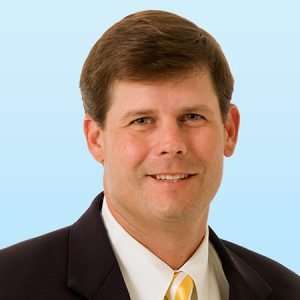
David Feild
Our Industrial focused real estate brokers (warehouses, distribution, manufacturing) have been extremely busy over the past 9 months helping companies expand their location or add locations to help address supply chain challenges related to increased demand. We have done deals for amazon fulfillment centers, last mile needs for other e-commerce groups, expansion of warehouse and distribution space for tool manufacturers supplying Home Depot, Lowes and Walmart (each), and even a project for a paper company to warehouse their new ramp up of toilet paper production. All of this in the Upstate!! – David Feild
Our company partnered with the Charleston Medical Society to assist with purchasing and passing out personal protective equipment that providers throughout the state had purchased. This was an effort to assist with providers who may not have the means to purchase this much needed equipment in order to continue to support the patients that they have. Through the Charleston Medical Society locating a provider to purchase this equipment through and purchase in a large quantity overall, smaller providers were then able to purchase quantities that they could use. Had this not occurred when it did, these providers may not have been able to have access to this much needed equipment. We then coordinated sorting, packing and distributing this equipment through pick up locations throughout the state. – Angie Gossett
I was a participant in South Carolina Governor Henry McMaster’s AccelerateSC initiative. It was a truly collaborative effort across all sectors of our state’s economy, state agencies, academia, and other stakeholders. The group came together to make recommendations for our legislature to consider for CARES Act funding, provide guidance for business re-openings, discuss school re-openings, and other critical issues facing our state. – Sara Hazzard
The SC Arts Alliance has always worked alongside our nonprofit counterpart, TogetherSC. But during COVID-19, our partnership became more tangible than ever. Both of our groups worked hard to have the SC Legislature include a nonprofit COVID relief grant program, to the tune of $25 million, in the state’s CARES Act allocation this fall. As of writing, grants had not yet been awarded, but nearly 1,600 applications were submitted to the state. – G.P. McLeer
The Laurens County Chamber of Commerce coordinates Zoom calls with representation across Laurens County to discuss pain points, needs, ideas, and to share resources. – Amanda Munyan
I have appreciated the opportunity to serve as part of the Bringing Back the Burg Task Force (https://www.onespartanburginc.com/bringingbacktheburg), a recovery effort activated by OneSpartanburg, Inc. Over three dozen task force members across all sectors have identified needs within the community, many of which have been addressed quickly. – Katherine O’Neill
Worked with the educational community to address the need to see that teachers and students return to school safely. – Chuck Saylors
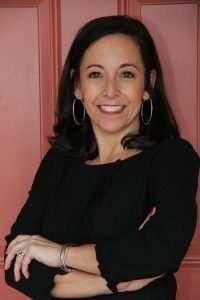
Liz Seman, Chief of Staff, Furman University; Greenville County Council member
The most impactful collaboration I’ve been involved in is the allocation of the $91M CARES Act funding received by Greenville County. I’m so thankful for the way the county staff, members of county council, the nonprofit community and business community came together to ensure that the money was invested in ways that directly impacted those being hit the hardest by the pandemic. There were some really innovative partnerships and programs developed that I hope will continue as our community recovers – physically, emotionally and economically. – Liz Seman
I am so proud of and grateful for the collaboration between the Greenville Partnership for Philanthropy (GPP) and the NonProfit Alliance that has strengthened this year. Because grants to nonprofits are the primary ways that philanthropy funders – who are the members of GPP – fulfill their missions, there has always been a relationship between GPP and the NonProfit Alliance. But this year, we held regular meetings with both of our memberships and we collaborated to launch the 21 day equity challenge, to host a forum with County Council candidates, and to strategize on the many COVID-related activities in our community. – Katy Smith
Our United for All Fund and COVID response. Raised over $500K, assisted almost 800 households, partnered with emergency assistance agencies to provide funding and other needs, coordinated 40+ community calls in 6 weeks for a coordinated response. – Paige Stephenson
What has been an unforeseen challenge you have needed to overcome during the pandemic? How did you do it?
We needed a crash course in digital meeting software. There are no less than four platforms we have had to learn and familiarize ourselves with in order to participate in the virtual meetings required to continue our efforts to attract new jobs and investment to Greenville. – Mark Farris
Balancing the very different needs and mindsets of different people within our own organization. From younger to older, those with underlying health conditions, or people with at-risk family members, everyone has varying thoughts on to function during this time. Our response has been to create written policies and procedures for in-office work that has been made applicable to all. In addition to a thorough set of rules and regulations we have made changes as new information has been made available and walked the teams through the changes and the subsequent new expectations. People value straightforward clear expectations, particularly if they feel they have a voice in the creation. – David Feild
Communication through technology, virtually. I dove in head first and did the best I could through trial and error, like everyone else. This has been a valuable learning experience and changed the way we do many things day to day, some for the better. – Amanda Munyan
Instilling confidence that returning to school is safe. It is still ongoing. – Chuck Saylors

Tim Todd, Executive Director of Discover Upcountry Carolina Association
It’s been very challenging for our organization to find the right balance in our efforts to market our region as a tourism destination. Our partner businesses and organizations need visitors in order to survive, but conducting advertising & marketing campaigns can be viewed as inappropriate and reckless by some. We have attempted to promote our destination and the attractions and activities where social distancing can be done and have targeted visitors within a 300-mile radius. – Tim Todd
You can read the first set of questions here.
You can view the list of participants here.

Dec 14, 2020 | Staying on Top, UpstateVibe365
 Regardless of the sector or location, 2020 has been a trying time for all Upstate entities. As we move into a new year, an uncertain future remains. To help us to better understand some of the ongoing challenges from the pandemic and resulting economic crisis, we have compiled a group of local, regional and state business, government and non-profit leaders who will periodically share their insights on a variety of topics and community issues. By sharing their struggles, successes and continued efforts they will help all Upstate entities better understand and navigate this uncertain future.
Regardless of the sector or location, 2020 has been a trying time for all Upstate entities. As we move into a new year, an uncertain future remains. To help us to better understand some of the ongoing challenges from the pandemic and resulting economic crisis, we have compiled a group of local, regional and state business, government and non-profit leaders who will periodically share their insights on a variety of topics and community issues. By sharing their struggles, successes and continued efforts they will help all Upstate entities better understand and navigate this uncertain future.
In our first set of questions to the group, we asked them about how they personally and within their organizations and communities have addressed some of the challenges associated with the pandemic and resulting impacts.
Each member was asked to answer at least two questions within the set.
What is one significant change you have made personally or professionally during the pandemic that you would not have done if not for the pandemic?
I have spent a lot more time at home with our young son since the pandemic began. Though it has been very difficult to balance childcare with working full-time, I feel (and I am told) that I will not regret spending this time with him when we are both older. I much better appreciate the plight of working parents, and how public policy makes childcare so much more difficult and expensive than it should be. – Paul Cain, Oconee County Council Member
As with most, I have had to become proficient in all manner of virtual and electronic communication and being very much oriented to personal one on one communication, this was a somewhat difficult task for me. It also required me to hone my skills at more succinct/efficient messages to my members and board, understanding that some things may be lost in translation or misconstrued when not accompanied by the usual voice inflection or other personal touch. – Susan Cohen, President, Clemson Chamber of Commerce
Our entire list of SOP’s have changed, at least professionally. Socially distanced, mask-wearing prospect visits, virtual incentive negotiations, no travel for trade missions or company visits. While activity has been surprisingly good, the overwhelming health risks associated with the pandemic has definitely slowed the search process for many of our prospective companies. – Mark Farris, President, Greenville Area Development Corporation
I enjoy better connectivity with my colleagues across the state due to adoption and usage of virtual meetings. Like everyone, I’ve always had the technology, the pandemic just provided a reason to use it. – David Feild, Market President, Colliers International
I have slowed down to enjoy my surroundings more, my family, friends, and co-workers. – Amanda Munyan, President & CEO, Laurens County Chamber of Commerce
I have transitioned to an almost total virtual environment in my personal and professional life. In doing so, I learned to navigate numerous virtual platforms. This also brought new meaning to the phrase, “we are all in this together” as all of us were learning to adapt, be flexible and patient in navigating these challenging times. – Mamie Nicholson, President, Self Family Foundation
Virtual meetings, both personally and professionally. In the past, I had the wrong impression that virtual meetings were hard to set up. I am so grateful to have had this technology at my fingertips to keep projects moving forward – and to “see” my family over the last nine months. – Katherine O’Neill, Chief Economic Development Officer, One Spartanburg
Made direct connections to our clients. – Chuck Saylors, Vice President, MB Kahn; Greenville County Schools Trustee
We have always been a busy family, so sitting down for dinner multiple nights in a row was never really an option. The pandemic not only provided a chance for us to sit down together every night for dinner (cooking or take-out), it also provided time for Steve and I to spend with our son Walker as he finished his senior year at Furman from our home. I consider this “forced” family time one of my “COVID silver linings”. – Liz Seman, Chief of Staff, Furman University; Greenville County Council member
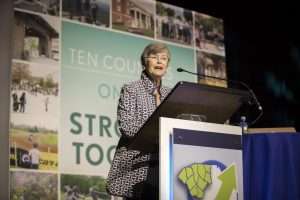
Minor Shaw, Chairman, Daniel-Mickel Foundation
I have become more “tech” savvy and have learned various forms of communication tools – zoom, Microsoft teams, Web X, etc. This has allowed me to be at home more with my family, work from our vacation home at the beach, etc. I have also connected with new and old friends. – Minor Shaw, Chairman, Daniel-Mickel Foundation
We have transitioned board and committee meetings to a virtual video format. We had utilized a call-in option on occasion that was not effective. Using a virtual video format has increased our board member attendance and has not diminished our board engagement in generative discussion. Going forward, this will be an option for all board and committee meetings. – Paige Stephenson, President & CEO, United Way of the Piedmont
Professionally – A refocus on how we communicated with existing industry. We usually met with our existing industries on a biannual basis in person. Due to the dynamics of the pandemic, we started reaching out regularly to our existing and examining their needs. – Stephen Taylor, Director, Abbeville County Economic Development
COVID-19 provided me an opportunity to rethink my professional goals. In August, I began my MBA journey at the University of South Carolina – Aiken. I have found the experience rewarding and very timely given our present circumstances. – Trentsie Williams, Director of Finance, Meg’s House
Have you personally started or rekindled any habits, hobbies or such things to help you deal with the added stress and anxiety of these unsettled times?
I have begun mountain biking, hiking, and talking walks regularly. Unfortunately, in my pre-COVID busy-ness, I forgot what originally attracted me to the Upstate: incredible natural beauty. COVID has forced me outdoors to recreate and to socialize, and I am very grateful to be reacquainted with God’s beautiful creation. – Paul Cain
The early days of the pandemic, with many activities unavailable, allowed me the time to actually sit and read a book, many in fact and I also rekindled my hobby of painting. – Susan Cohen
My main outdoor activity is backpacking and I have been able to do more this year although the trails are decidedly busier. If the pandemic has taught us anything it’s that our society values an opportunity to get outside and reconnect with nature. I’ve noticed that Greenville County’s Geer Highway has three times the number of cars than in years past. These outdoor assets that we may have taken for granted in years past are being overwhelmed. – Mark Farris
I have re-adopted my on-again / off-again hobby of jogging. I have become much more consistent over the past 9 months and even had to buy some better fitting clothes. – David Feild
My husband and I purchased kayaks and used them over the summer to explore new lakes that we have not been able to go to in the past. This was something that allowed us to get outside, get some exercise and see some new places! We were able to fish from these as well so have been in search of catching the big one! The ability to be so quiet on the water allows you to also get up close with wildlife along the shore. We also set up a saltwater fish tank and have been learning about the care and upkeep of that. There are so many different fish and corals to learn about and instead of turning the TV on, we have been able to keep it off and just watch the tank. We have also been reading on the care and upkeep of the tank and learning a lot about it. Yet another way to allow us to turn off the news and find something relaxing to do together. – Angie Gossett, Regional Marketing Director, BlueCross BlueShield of South Carolina
Yes. While I have always enjoyed fitness, I recently branched out and began the C25K running program. It allows for 30-45 minutes of down time and has allowed me to truly unwind and unplug during these uncertain times. – Kelly McWhorter, Executive Director, Discover Greenwood
I have started listening to podcasts more often, some inspirational and some entertaining. Depending on my current mood or need, I can find comfort or pleasure through various topics. – Amada Munyan
I’ve been curious about meditation and mindfulness for a long time, but I haven’t made an effort to actually sit down and practice it. During the summer, I downloaded the app Ten Percent Happier (after I listened to Dan Harris’s great book by the same title) and did their 21- day meditation challenge (which the app’s creators noted was a bit of an oxymoron, since practicing mindfulness shouldn’t feel like a competition). I’ve continued with regular meditation, and I can honestly say that I feel it has rewired my brain: my stress and anxiety are lower and some chronic pains have gone away. – Katy Smith, Executive Director, Piedmont Health Foundation and Greenville Partnership for Philanthropy
One of the biggest things that has helped me personally has been having a support group of peers that are dealing with the pandemic and our response. We have a group of City Manager/Administrators that can provide support in challenging times, find humor where possible, and help vent when needed. We have also been able to share solutions and items that have been implemented during Covid response. With no one having a guide or previous experience in handling such matters, having a support group of colleagues has been a very valuable tool to help deal with the stress and anxiety that Covid has brought. – Stephen Steese, City Manager, City of Easley
I now have specific news podcasts that start my day. I also have spent more “off” or “between” times listening to audiobooks. During warmer weather, I was walking as a stress reliever. – Paige Stephenson
What has been the general “spirit” of people within your work place or community in dealing with the unforeseen and unpredictable challenges resulting from the pandemic and its wide-spread impacts?
The health system is built for short-term disasters and emergencies. I have seen tremendous swings in “spirit” of the healthcare workers. At the onset there was amazing energy and coordination to prepare. As the pandemic has pushed on the emotional strength of healthcare workers has been tested. During the first local surge in June and July, the team responded very well. While weary, they pushed through and felt very accomplished. However, as we are experiencing the onset of the 2nd surge we are seeing signs of PTSD resulting in fear, anger and defeat. I saw a great meme last week of a nurse holding a sign that simply said, “just wear your mask…I’m tired”. – Justin Benfield, Chief Executive Officer, Prisma Health – Laurens County Hospital
Our team understood we needed to keep our social media outreach, to both members and the public, as robust as possible to insure we stayed top of mind, especially in our tourism promotions. I feel it fostered a renewed commitment to look past “the way we have always done things” – after all we had no choice but to change, and everyone pitched in. – Susan Cohen
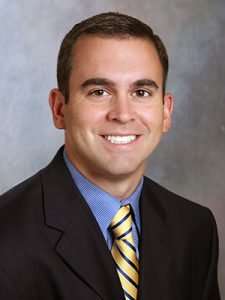
Neal Collins, SC House of Representatives
From a legislator perspective, I would say one word for the community is “resilient.” 2020 has been a tough year for everyone. The community has been understandably concerned about health, finances, and liberties. Many have gone on unemployment briefly. Many have been infected or know someone close who has been. All have sacrificed in some form or fashion. Through it all, there have been many more examples of kindness than not. The community has been resilient. – Neal Collins, Representative, S.C. House of Representatives
While there are groups of people at either end of the spectrum, most of the folks I have been around are cautious and concerned but not letting the pandemic consume their lives. I think it’s been shown that with appropriate safeguards, the virus threat can be reduced. I’m also surprised that the combination of recent social unrest, economic insecurity AND the pandemic have shown the majority of people to be humane and considerate. – Mark Farris
For the most part, the spirit has been one of innovation and resourcefulness – how do I do my job, serve my client, meet my goals with these new challenges? We have also tried to treat this pandemic as an opportunity for increased market share at the expense of those not being creative and innovative. – David Feild
The general spirit has been one of adaptability as people have worked from home, meetings and events have shifted to virtual, and school closures and alternate schedules have changed. In addition, we have all learned a little more about each other’s personal lives. From pets on Zoom and kitchen backgrounds, to children screaming and maybe even a few awkward moments as a spouse pops up in the background of a call. I think it has taught us all not to take ourselves too seriously and to be a little more gracious to our colleagues as everyone faces challenges. – Sara Hazzard, President & CEO, South Carolina Manufacturers Alliance
The arts industry is, to be blunt, getting killed out there. The field’s entire business model relies on gathering people, typically in one space for a few hours, with success tied to the number of people at that gathering. Additionally, for many art forms, the creation of artwork requires numerous people in close proximity – theatre, dance, music for example. Each organization has had to find ways to either shift their entire program models, go into a state of limbo, or drastically reduce their footprint – usually a combination of both. But while the industry overall feels helpless at many times, there is innovation and hope springing from this crisis. Creativity comes from limits, and there are plenty of limits in place right now. Changes in business models, physical operations, and program innovation are occurring. – G.P. McLeer, Executive Director, South Carolina Arts Alliance; Mayor, City of Fountain Inn
Our work environment has tried its best to forge ahead despite the pandemic. While our staff turnover has been higher than most years, ironically, it is due to retirements, career changes, and the like. Fortunate that no staff positions have been sacrificed due to the pandemic. So overall, our spirit is optimistic that 2021 will see better opportunities to come together again for special events, festivals, recruited events, etc. – Kelly McWhorter
Overall the small group of people I communicate with daily have kept their spirits up. There have definitely been some moments of worry and concern, but I have been amazed at the ability of others to adjust to the circumstances. – Amanda Munyan
I am so proud of the level of connectedness, collaboration, communication and partnership that has developed around taking care of our community, our children, our elderly, our nonprofit organizations and just a general acceptance of what we have considered normal may never be “normal” again. – Mamie Nicholson
I have been tremendously impressed with the “good spirit” of the people with whom I work, whether in the community or in my work venues, both for-profit and not-for-profit. The circumstances surrounding COVID have resulted in more entrepreneurism and determination. – Minor Shaw
There has been a mixture of challenges in resulting from the pandemic and how people throughout our community has handled these challenges. The general spirit of people in the community can be split into three general groups. The first is those that are upset that their lives have been impacted by the pandemic through cancelled events, impacts to school, and just the feeling that actions are overreaching. There is a set that believes that our actions have not gone far enough and that we should make more restrictions and more actively enforce them. The last group is the majority of the citizens and those are ones that are trying to balance some semblance of pre-Covid life and the impact it has had on their life. These are most see here in our Parks and Recreation programs. It is people who are willing to comply with restrictions, protocols, and quarantines to try and maintain some engagement and outreach for their children. – Stephen Steese
Our team members have risen to the occasion. There have been moments of feeling overwhelmed, but we’ve tried to encourage team members to step away and recharge. We’ve established a “wellness Wednesday” for team members to participate in a variety of mindfulness or self-care activities. – Paige Stephenson
I feel that our community has taken on the pandemic quite well. I think my biggest concern in a rural community is the elderly. Most people who are shut in get very little interaction. Our rural telephone cooperative provided additional free wi-fi hotspots in more places in order for the public to have access to wi-fi if they did not already have it in their homes. – Stephen Taylor
One co-worker has faced a good deal of additional stress because of ever-changing school schedules – he has two children, ages 6 & 9, and his wife is a teacher. Eight members of another co-worker’s family tested positive for COVID-19. She had to miss approximately two weeks of work because of this, but thankfully, everyone completely recovered. Despite these circumstances, they have done very well with their job responsibilities. – Tim Todd, Executive Director, Discover Upcountry

Trentsie Williams
My workplace has responded well to the unforeseen and unpredictable challenges. Our office worked remotely for 10 weeks and continued to provide excellent services to the clients we serve. Through weekly Zoom meetings, we discussed the challenges of serving our clients as well as the physical and mental challenges of everyday life during a pandemic. – Trentsie Williams
You can read the second set of questions here.
You can view the list of participants here.

Dec 9, 2020 | UpstateVibe365

Corie Culp, AFL
Before COVID-19 was declared a pandemic, AFL’s leadership team was monitoring the situation and developing an action plan. As an international manufacturer, locations in Asia and Europe were being impacted before those impacts were ever felt at our headquarters, in Spartanburg, SC. AFL leaders across the globe were meeting daily, creating plans to protect associates while keeping operations steady. AFL focused its efforts on three strategic imperatives: keeping associates safe and healthy; maintaining operational effectiveness during the crisis; and preparing for “life after the crisis.”
AFL was (and still is) an essential business. AFL manufactures fiber optic cable, connectivity and accessories for the telecommunications industry, and provides installation services for customers and end users. By early March, the leadership team determined that the safest option for all associates was to separate essential from nonessential manufacturing associates. Both manufacturing and installation services associates continued working onsite or in the field while office and professional associates were moved to a work-from-home (WFH) status.
Within the manufacturing facilities, the first challenge addressed was minimizing the risk for associates while executing day-to-day operations. The plants were divided into zones with each zone “isolated” from another to limit potential exposure. Furthermore, associates who supported the manufacturing floor were divided into crews that were isolated and rotated so if one crew was exposed, the others could continue to operate. Everyone was subject to COVID protocols and Personal Protection Equipment (PPE) (e.g. masks, separate entrances/bathrooms/breakrooms, hand sanitizers, etc.) Areas denoting six-foot distances were marked on the floors, and janitorial service was increased for cleaning and disinfecting bathrooms, workstations and common areas.
 Office and professional personnel transitioned to a WFH status. Implementing Microsoft Teams globally in late 2019 proved to be an asset. COVID accelerated our digital transformation, providing new avenues for teams to communicate across local, national and global boundaries. Meetings once held in conference rooms became meetings held virtually and served to keep associates connected and productive.
Office and professional personnel transitioned to a WFH status. Implementing Microsoft Teams globally in late 2019 proved to be an asset. COVID accelerated our digital transformation, providing new avenues for teams to communicate across local, national and global boundaries. Meetings once held in conference rooms became meetings held virtually and served to keep associates connected and productive.
As associates were settling into new working conditions, another team was formed and tasked with determining procedures for the return to office. With seven facilities in the Spartanburg area and more than 1,000 associates, safety was the main concern. The “Back Together” team developed a highly detailed plan consisting of:
- Implementation of zones. Each building became a zone with multiple zones in most buildings. Associates were not allowed to enter another building or cross into a different zone without prior approval. In effect, zoning would help contain the spread of COVID and enable contact tracing should a breakout occur.
- Installation of temperature kiosks for daily temperature checks, touchless water and ice machines, door stoppers, faucets, soap and paper towel dispensers.
- Occupancy limits for conference rooms of varying sizes.
- Issuance of PPE (hand sanitizer, masks and a stylus for high touch points such as printers/copiers, microwaves, etc.)
- Travel restrictions aligned to domestic and international guidance
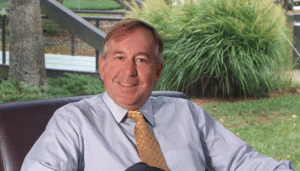
Jody Gallagher, President & CEO of AFL
Communication and transparency were key. Jody Gallagher, president and CEO of AFL sent periodic video messages to associates with business updates and words of encouragement. “Do Your Part” emails consisting of CDC recommendations and videos were and are still being sent, reinforcing the need to practice safety at work, home and when traveling. Electronic newsletters were issued for continued awareness and included video testimonials of associates who experienced COVID directly. Communication with customers was also enhanced through hosting more educational webinars, demonstrating products live on our social media channels and exhibiting at virtual trade shows.
AFL’s return-to-work started early June and ended late July. Currently, approximately 95% of AFL’s workforce has been back in the office. Special consideration has been given to associates with health implications and those who care for elderly parents. As schools began again in September, AFL supported parents working from home up to 24 hours per week to provide needed flexibility for home schooling and childcare. For manufacturing associates, AFL supported this transition by changing shift schedules to accommodate the needs of parents.
Fortunately, AFL has thrived during the pandemic. In January 2020, the FCC took a step to close the digital divide by establishing the Rural Development Opportunity Funds (RDOF) bid to fund the deployment of high-speed broadband networks in rural America, directing up to $20.4 billion over ten years to support unserved rural areas. With the shutdown across America, COVID exposed this need even more so. AFL is well-positioned to support this initiative with the fiber optic infrastructure needed.
As we approach 2021, AFL is expanding operations in the upstate and abroad. AFL’s leadership and Back Together team continues to meet periodically, watching the ebb and flow of COVID on a per region basis. With the holidays upon us, the leadership team moved office personnel back to a WFH status with a projected return date of mid-January.
In closing, it would be remiss not to recognize our associates. We wouldn’t be where we are today without the fortitude of those who stayed during the shutdown to maintain operations and the commitment of those who worked from home. On behalf of AFL, we want to thank them for their dedication to AFL and the AFL family!

 Kyle Player, Executive Director of Agribusiness Center for Research and Entrepreneurship (ACRE) talks about the ACRE curriculum and funding and introduces grant recipients Lover Farms in Pickens County and The RobinHood Group’s Farmers Market Flavors Ice Cream Company in Union County.
Kyle Player, Executive Director of Agribusiness Center for Research and Entrepreneurship (ACRE) talks about the ACRE curriculum and funding and introduces grant recipients Lover Farms in Pickens County and The RobinHood Group’s Farmers Market Flavors Ice Cream Company in Union County.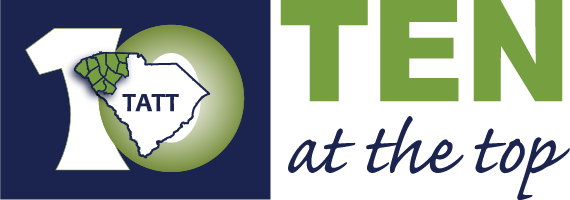


 We recognized more than 130 of our “Upstate Unsung Heroes” during a
We recognized more than 130 of our “Upstate Unsung Heroes” during a 










 Office and professional personnel transitioned to a WFH status. Implementing Microsoft Teams globally in late 2019 proved to be an asset. COVID accelerated our digital transformation, providing new avenues for teams to communicate across local, national and global boundaries. Meetings once held in conference rooms became meetings held virtually and served to keep associates connected and productive.
Office and professional personnel transitioned to a WFH status. Implementing Microsoft Teams globally in late 2019 proved to be an asset. COVID accelerated our digital transformation, providing new avenues for teams to communicate across local, national and global boundaries. Meetings once held in conference rooms became meetings held virtually and served to keep associates connected and productive.